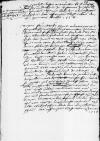Vor etlichen moneten(n) hab wir ein ⌊⌋ von euch gehabt, / dar innen ir uns anczeigt, / wie etliche heut mit vin de ⌊sant Martin⌋ durch ewerm(m) diner ⌊Albrecht Kuoen⌋ gen Antorff superinscribed in place of crossed-out Augspurg⌈Augspurg ⌊Antorff⌋ Antorff superinscribed in place of crossed-out Augspurg⌉ an ⌊Francz W written over V⌈VWW written over V⌉erner⌋ sey geschickt, / des zu schreibens wir euch fruntlich dancken(n). / Haben ouch gedochtm(m) ⌊Franczen⌋ lossen wissen, wie er sich mit dem wein sol haltn(n) etc. Hie schicke wir euch dis puntel mit briven an(n) ew(e)r tochterman(n) senor ⌊Hieroni(m)o Seler⌋, unsern(n) sundren vortrauten(n) freundt in ⌊Hispanien(n)⌋, / und in abwesen(n) an(n) ewrm(m) diner ⌊Albrecht Kuon⌋ zu senden(n). / Bittn(n) derhalben(n), / wolt dem so lo vorschaffen, das dem so gesche. / Sol ouch was daruff ghen, / leth uns superinscribed in place of crossed-out mir⌈mir uns uns superinscribed in place of crossed-out mir⌉ anschreibn(n). / Wollenn uns superinscribed in place of crossed-out Wil mich⌈Wil mich Wollen(n) uns Wollenn uns superinscribed in place of crossed-out Wil mich⌉ gen euch und die ew(e)r recht haltn(n). / Und wor wir euch doneben ouch imants von(n) ewern(n) weg(en) werd(en) wissen vil furdrung und freuntschafft thun, / wolle wir alweg willig gefund(en) werden. / Hiemit thu wir euch in langweriger gesuntheit und aller gluckseligheit / Gote dem almechtig(en) befhelen(n). /

 BCz, 244, p.29 (b.p.)
BCz, 244, p.29 (b.p.)